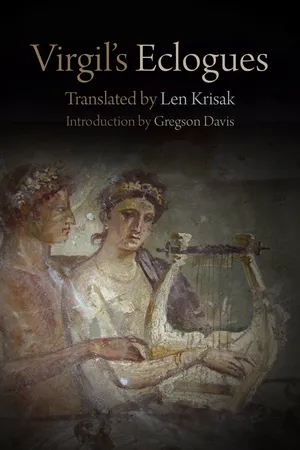
- 112 pages
- English
- ePUB (mobile friendly)
- Available on iOS & Android
Virgil's Eclogues
About this book
Publius Vergilius Maro (70-19 B.C.), known in English as Virgil, was perhaps the single greatest poet of the Roman empire—a friend to the emperor Augustus and the beneficiary of wealthy and powerful patrons. Most famous for his epic of the founding of Rome, the Aeneid, he wrote two other collections of poems: the Georgics and the Bucolics, or Eclogues.The Eclogues were Virgil's first published poems. Ancient sources say that he spent three years composing and revising them at about the age of thirty. Though these poems begin a sequence that continues with the Georgics and culminates in the Aeneid, they are no less elegant in style or less profound in insight than the later, more extensive works. These intricate and highly polished variations on the idea of the pastoral poem, as practiced by earlier Greek poets, mix political, social, historical, artistic, and moral commentary in musical Latin that exerted a profound influence on subsequent Western poetry.Poet Len Krisak's vibrant metric translation captures the music of Virgil's richly textured verse by employing rhyme and other sonic devices. The result is English poetry rather than translated prose. Presenting the English on facing pages with the original Latin, Virgil's Eclogues also features an introduction by scholar Gregson Davis that situates the poems in the time in which they were created.
Tools to learn more effectively

Saving Books

Keyword Search

Annotating Text

Listen to it instead
Information
The Eclogues

ECLOGA I
Meliboeus: | |
Tityre, tu patulae recubans sub tegmine fagi | |
silusetrem tenui Musam meditaris auena; | |
nos patriae finis et dulcia linquimus arua. | |
nos patriam fugimus; tu, Tityre, lentus in umbra | |
formosam resonare doces Amaryllida siluas. | 5 |
Tityrus: | |
O Meliboee, deus nobis haec otia fecit. | |
namque erit ille mihi semper deus, illius aram | |
saepe tener nostris ab ouilibus imbuet agnus. | |
ille meas errare boues, ut cernis, et ipsum | |
ludere quae uellem calamo permisit agresti. | 10 |
M: | |
Non equidem inuideo, miror magis; undique totis | |
usque adeo turbatur agris. en ipse capellas | |
protinus aeger ago; hanc etiam uix, Tityre, duco. | |
hic inter densas corylos modo namque gemellos, | |
spem gregis, a! silice in nuda conixa reliquit. | 15 |
saepe malum hoc nobis, si mens non laeua fuisset, | |
de caelo tactas memini praedicere quercus. | |
sed tamen iste deus qui sit, da, Tityre, nobis. |
ECLOGUE I
Meliboeus: | |
Under a beech’s stretching branches, there you lie, | |
Tityrus, trying, on the slimmest reed, to court | |
The forest muse, while I must leave, saying good-bye | |
To home, with its dear fields. But you, in shady ease, | |
Make “Lovely Amaryllis” echo through the trees. | 5 |
Tityrus: | |
Well, Meliboeus, one who’s like a god to me | |
Gave me this peace. His altar stone will always be | |
Bloodstained from spring lambs barely in the pen a day, | |
Because he lets my cattle roam, as you can see, | |
And lets me play my panpipe—any melody. | 10 |
M: | |
I’m far less jealous than amazed, my friend. The land |
Table of contents
- Cover
- Half title
- Title
- Copyright
- Contents
- Introduction
- Translator’s Preface
- The Eclogues
- Notes
Frequently asked questions
- Essential is ideal for learners and professionals who enjoy exploring a wide range of subjects. Access the Essential Library with 800,000+ trusted titles and best-sellers across business, personal growth, and the humanities. Includes unlimited reading time and Standard Read Aloud voice.
- Complete: Perfect for advanced learners and researchers needing full, unrestricted access. Unlock 1.4M+ books across hundreds of subjects, including academic and specialized titles. The Complete Plan also includes advanced features like Premium Read Aloud and Research Assistant.
Please note we cannot support devices running on iOS 13 and Android 7 or earlier. Learn more about using the app